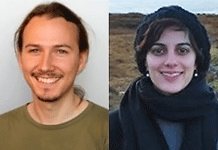Articles

Dr Horsley and Dr Lamba are among 44 new University Research Fellows announced by the Royal Society for 2016.
Exeter scientists awarded prestigious Royal Society University Research Fellowships
Three outstanding early-career scientists from the University of Exeter have been bestowed with prestigious fellowships from the Royal Society.
Simon Horsley, Shakti Lamba and Karl Wotton are among 44 new University Research Fellows, announced on Thursday by the Royal Society, for 2016.
The prominent scheme aims to provide outstanding early-career scientists, who have the potential to become leaders in their chosen fields, with the opportunity to build an independent research career;
Dr Horsley, a Research Fellow in the Physics and Astronomy department of the University of Exeter, will use his fellowship to develop new optical and acoustic material by employing complex coordinates.
Dr Horsley said: “I’m very excited to have been awarded a Royal Society Tata Research Fellowship. It will give me the opportunity to think and deepen my knowledge of wave physics, through exploring new areas of physics and mathematics. To build on a line of research that I have just begin to develop.
“The Fellowship also gives me the opportunity to interact with the other research fellows, and finding out whether there are any unexpected links between my research and theirs.”
Meanwhile, Dr Shakti Lamba, a Senior Lecturer in Human Behavioural Ecology and based at Exeter’s Penryn Campus in Cornwall, will use her fellowship to test evolutionary theories of human cooperation in the real world.
Dr Lamba said: “The Fellowship has given me the gift of extended time to think and develop large-scale, long-term projects that would otherwise be very difficult to do. I look forward to using this time freely and creatively.”
Dr Karl Wotton, from the Biosciences department at the Penryn Campus, will study the environmental and genetic basis of migration in the marmalade hoverfly through the Fellowship.
The prestigious 2016 University Research Fellowships Programme has this year expanded, thanks to generous support from Tata companies over the coming years and from the Global Challenge Research Fund. The researchers will take up their new posts at institutions across the UK and Ireland at the start of October.
The scheme is extremely competitive and URFs are expected to be strong candidates for permanent posts in universities at the end of their fellowships, and many have gone on to enjoy significant national or international recognition for their work.
The Royal Society is a self-governing Fellowship of many of the world’s most distinguished scientists drawn from all areas of science, engineering, and medicine. The Society’s fundamental purpose, as it has been since its foundation in 1660, is to recognise, promote, and support excellence in science and to encourage the development and use of science for the benefit of humanity.
Date: 30 September 2016
